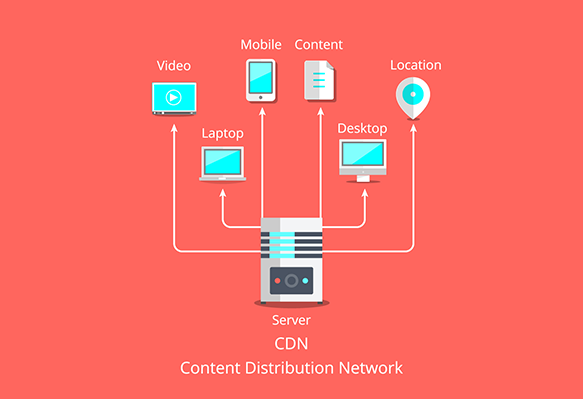Let’s define CDN and how it can help your site

The digital space is growing stronger than ever. In a Forbes article, writer Bernard Marr pens, “the amount of data we produce every day is truly mind-boggling. There are 2.5 quintillion bytes of data created each day at our current pace, but that pace is only accelerating with the growth of the Internet of Things (IoT).” If you run a business and are somewhat visible online, you know for sure that figure is only going to increase. This article is going to explore how future-forward entrepreneurs can improve their global visitors’ website experiences. To start, let’s define CDN.
But before we dive right CDN definition, let’s clarify what route of tech we’re discussing today. Picture this: if a website’s origin server is California-based, people viewing from Las Vegas and Phoenix are bound to receive content faster than those in New Zealand or even New York. The farther these visitors are from the origin host, the higher the chances of a site’s or app's content loading slower—an activity that can easily translate to a loss of sales or interest from your target market.
Furthermore, one study cites that any length of lag times can frustrate both mobile and web users. Because premium digital encounters equate to both tram and potential sales now, it’s only right for business leaders to invest in a CDN.
According to the study, a quarter of users immediately leave a website it loads longer than four seconds. Additionally, more than 70% of visitors opt-out from a site if it takes longer to load than five seconds on their mobile device. Interestingly, almost 50% of users are also expected to be non-returnees to websites that function poorly.
Anyone serious about making a name for their business online knows how serious this can be. After all, it’s safe to say that customers now take into account the whole brand experience before fully promoting it. Fortunately, these are things CDNs can remedy.
Let’s define CDN
A Content Delivery Network (CDN) works to distribute content and media to website users as efficiently and quickly as possible. Because it is made up of a group of servers scattered in many parts of the world, users from anywhere in the globe will find that the sites they visit that are augmented by a CDN work faster.
It’s pretty simple: the CDN that is nearest a visitor is referred to as the “edge server.” That means every time a user opens a CDN-served website, they’re immediately routed to their edge server. What this achieves is a stunning overall digital experience. While it is mind-blowing to many, a CDN’s process is easy to digest: website owners can temporarily store their media and other files in a CDN. That way, it’s conveyed to your site visitors from the edge much faster; as opposed to your content having to come from the origin server.
Using a CDN guarantees that your site content only travels to a nearby Point Of Presence, ensuring that your global visitors receive the same top-notch digital experience your nearby customers do. If your site’s origin host is based in Australia and many of your customers are in London, you can already be assured there’ll be problems with lagging.
Which companies should use a CDN?
Logically, anyone who runs a mobile application or a website that receives a good amount of traffic—meaning sites and apps that are likely to accommodate more than one visitor at a time—can make use of CDN services. But take note that CDNs benefit complex and large websites the most; ones that have hundreds and hundreds of users spread out in various countries. CDNs are also very useful to mobile apps and websites that have a ton of engaging and dynamic media.
To name a few, the industries below are prime examples of business sectors that can take advantage of a CDN
Finance — because financial institutions carry a lot of sensitive information, CDNs help them by offering quick, dependable, and protected infrastructure that efficiently transmits the data their customers need.
E-commerce — when the primary function of your site is to sell products and services to a global audience, best believe an exceptional CDN makes the shopping experience of your users a pleasant one. Because speed is of utmost importance in a context like this, it would be detrimental for your buyers to have to wait for pictures to load or for their payments to go through.
Media — as a thriving industry that promotes, publishes and broadcasts a variety of content for news and entertainment purposes, media sites have to be on top of their game in the efficiency and speed department. CDNs help make both aspects a reality for those in this industry.
Are you now looking for CDN providers? Contact the best CDN provider today. Visit belugaCDN.com now!
What Is Content Delivery Network
Power-up your Content Delivery
30 Day Free Trial Cancel Anytime